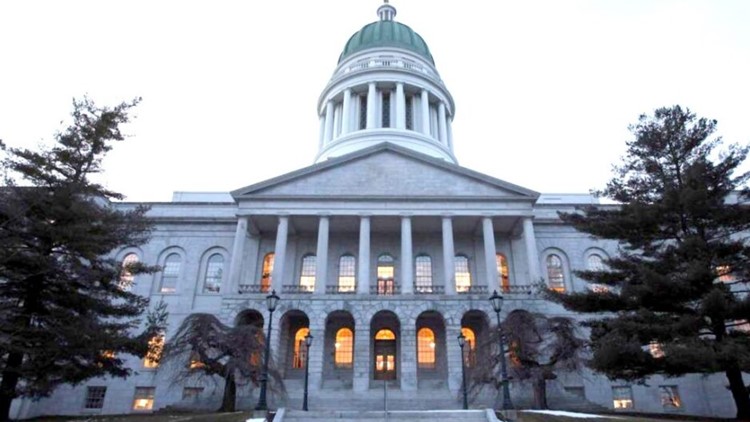AUGUSTA, Maine — Hidden beneath the murky phrasing of Question 6 on the Nov. 7 ballot is an amendment that would reintroduce language, long out of print from Maine’s constitution, honoring the state’s historical obligations to tribal nations.
Section 5, Article X of the constitution was taken out of circulation by a statewide vote in 1875 and hasn’t appeared in copies since 1876. The section has remained in “full force” legally, however, and is available on the state legislature’s website, though omitted elsewhere.
The section binds Maine to honor the same duties and obligations to Native American tribes that Massachusetts did before Maine formally separated from the Commonwealth in 1820.
“The new State shall, as soon as the necessary arrangements can be made for that purpose, assume and perform all duties and obligations of this Commonwealth, towards the Indians with said District of Maine, whether the same arise from treaties, or otherwise…” the section reads.
Those words remained in printed copies of Maine’s constitution until Gov. Norman Dingley advocated for cleaning up the document he called “patches and out-of-date shreds” in an 1875 address.
At Dingley’s request, a constitutional commission was formed that year and recommended removing Section 5 and two additional sections that outline the formation of Maine’s legislature. After passage by the legislature, Maine voters approved their removal in a referendum.
Nearly a century and a half later, Question 6 asks whether voters want to resurrect those passages. To be clear, the rights and responsibilities to tribal nations in Maine are still contained in the constitution.
But they’ve been excluded from the printed copies of the constitution — and Question 6 seeks to restore the language to the printed copies.
The question, one of the eight referendum items, asks voters: “Do you favor amending the Constitution of Maine to require that all of the provisions of the Constitution be included in the official printed copies of the Constitution prepared by the Secretary of State?”
Voters will have access to a Maine Citizen’s Guide to the Referendum Election at their polling place, which breaks down which provisions will be reintroduced, according to Emily Cook, director of communications for the secretary of state’s office.
The motivations behind Section 5’s removal are unclear to some legal experts, citing a lack of evidence in a 2021 legislative research report. Its exclusion in print, Judson Esty-Kendall and Rachel T. Hampson concluded, had little effect on Maine’s obligations to tribal nations because the state “had reduced those obligations to a minimum.”
Historian Catherine Burns, however, found some link between Section 5’s removal from print and an attempt by Maine to “sidestep financial obligations” to the Passamaquoddy Tribe in a state Supreme Court case.
Regardless of the reasons for the removal, proponents say this year’s proposed amendment ensures transparency of the state’s history and boosts recognition of tribal sovereignty.
A campaign for Section 5’s reintroduction began in 2015, when a non-voting tribal member representing the Houlton Band of Maliseet Indians, Henry John Bear, introduced a bill to the Maine House of Representatives similar to the one that brought about Question 6.
A different bill requiring the state law librarian to make Section 5 more available took its place, according to the legislative research report, and the constitution went unamended. Bear introduced a similar bill two years later but it didn’t make it out of the state Senate, the report said.
During the most recent legislative session, broad bipartisan support for a bill introduced by Maine House Speaker Rachel Talbot Ross made the latest iteration of Section 5’s inclusion a success, earning approval from both chambers.
The only written testimony opposed to Ross’ bill came from Gov. Janet Mills, whose chief legal counsel Gerald Reid wrote, “this legislation would not solve any real-world problem, but would instead create new confusion.”
Reid said people might not understand that the proposed amendment would have no legal effect and “appears to be a misguided attempt to right a historic wrong that never occurred,” while touting Mills’ commitment to solving “specific, identifiable problems.”
But to Penobscot Nation Tribal Ambassador Maulian Bryant, the amendment does more than reprint abandoned words in copies of the state constitution: It recognizes a facet of sovereignty for tribal nations.
“And this is important to the Wabanaki, because while practically it might not have a huge day-to-day impact, it’s important in our kind of quest for recognition of our sovereignty,” Bryant said. “Because you need to be a sovereign nation to enter into treaties with other governments.”
The proposed amendment coincided with a legislative session that saw a separate bill boosting tribal sovereignty die after legislators failed to override a Mills veto. The legislation would have made more federal laws applicable to Native American tribes.
Aside from validating that sovereignty, Bryant said the proposed amendment provides people with a straightforward view of the state and its history.
“It’s also just sort of good common sense,” Bryant said. “Printing the full Maine constitution ensures that we have a fully transparent government.”
Bryant shares that view with Maine’s secretary of state, Shenna Bellows. Bellows’ written testimony supporting the legislation outlined her office’s role in reprinting the constitution and her individual commitment to open government.
“To have any provision of the constitution not printed but in full legal effect is antithetical to the entire premise of a transparent government,” Bellows wrote. “Making our state records, including the entire Maine constitution, more easily accessible to the public and the people we serve is a cornerstone for an open and credible democracy.”
Micah Pawling, associate professor of history and Native American studies at the University of Maine, said he recognizes the importance of making Maine’s constitution available in full form, showing the various changes or amendments through time.
Despite the renewed attention to Section 5, Bryant said its exclusion has long had the attention of Wabanaki people, attention she hopes is introduced to people unacquainted with the provisions outlined in Section 5.
“This is a topic that a lot of tribal folks (have) known about for a long time,” Bryant said at a Question 6 forum hosted Friday by the Maine Conservation Voters. “For us, thinking about treaty obligations that have not been acknowledged or viewed, that’s no big surprise.”
“I want my history to be visible. As a Wabanaki person that makes me feel honored and respected.”
This story was originally published by The Maine Monitor, a nonprofit and nonpartisan news organization. To get regular coverage from the Monitor, sign up for a free Monitor newsletter here.



